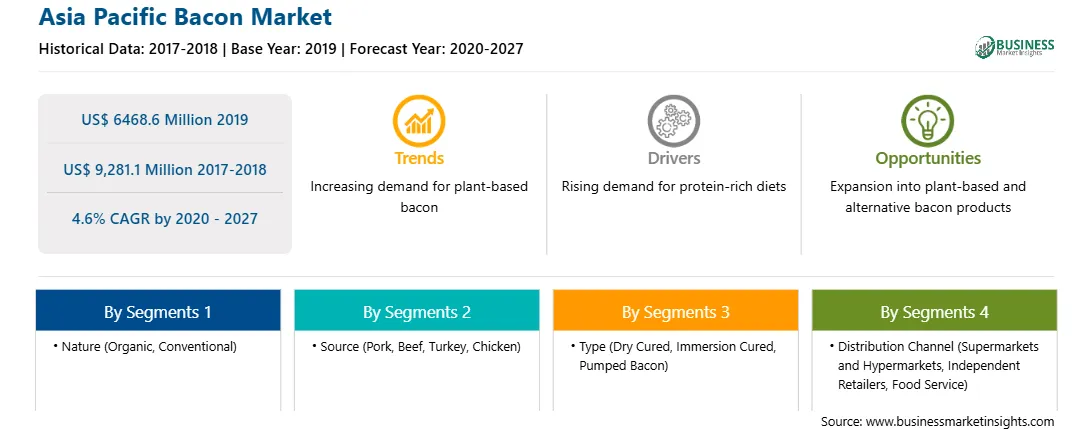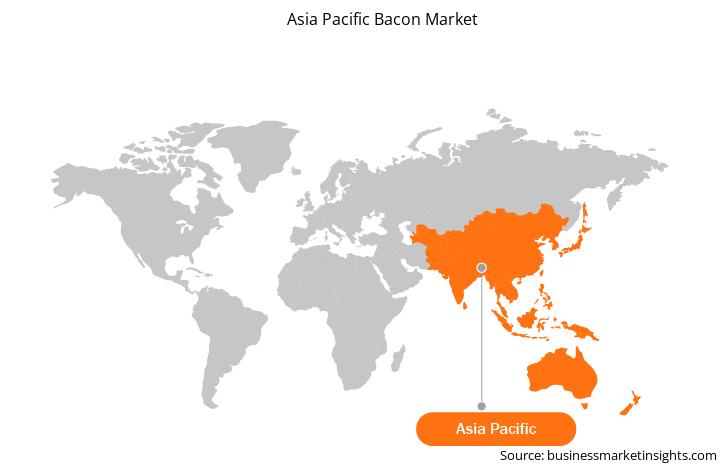APAC Bacon Market Forecast to 2027 – COVID-19 Impact and Analysis by Nature (Organic, Conventional), Source (Pork, Beef, Turkey, Chicken), Type (Dry Cured, Immersion Cured, Pumped Bacon), Distribution Channel (Supermarkets and Hypermarkets, Independent Retailers, Food Service, Others), and Country
Bacon refers to the sides and belly portion of the pig’s body that is cured and smoked. Bacon is versatile in terms of cooking and helps in increasing the flavor of dishes. When wrapped around lean meats, it proffers moisture while it is cooked. Development in meat processing technologies and an increase in the demand for meat protein, the bacon market has experienced tremendous growth during the past years. The upsurge in demand for pizza, sandwiches, and hamburgers have also bolster well the bacon market growth. However, bacon contains some amount of fats and sodium that increases the risk of heart diseases and blood pressure. This restricts the demand for bacon. The ketogenic diet slightly differs from the paleo diet. Instead of having the balanced ratio among the fats, carbs, and protein sources of energy in a keto plan basically come from fats and proteins, while consumers fill the body with fewer carbohydrates. However, this theory behind a keto diet is re-training the body to use fats rather than carbs for energy to increase weight loss. This trend of using meat products and bacon in keto and paleo diet will gain popularity among the health-conscious consumer and those who are willing to reduce weight. This, in turn, is expected to influence the bacon market. Thus, the usage of bacon in paleo and keto diet is expected to create a significant demand for bacon in the coming years, which is further anticipated to drive the bacon market.
The bacon market in APAC is expected to grow from US$ 6,468.6 million in 2019 to US$ 9,281.1
million by 2027; it is estimated to grow at a CAGR of 4.6% from 2020 to 2027. Usage of bacon in paleo and keto diet. Food trends defined the twenty-first century as a health and wellness culture among consumers. Along with the dietary programs such as Atkins and Weight Watchers reigned among the millennium, there has also been a shift to broader “lifestyle” trends. Starting from veganism to absolute raw food diets, people could presume the love for the favorite food like bacon is diminishing. Some of the fastest-growing food crazes include paleo and keto diet plans. Both the plants rely mostly on protein and healthy fats intake to sustain on low carbs. A paleo diet includes a maximum of meat (eat more bacon), and this diet is dense with nutrients along with high in fat and low in carbs. The Department of Anthropology and Radiology from Emory University had conducted a research study, and they found that our ancestors gained about 35 percent of their dietary energy by consuming fats, 35 percent from carbs, and 30 percent from protein. Hence, consumers can achieve the paleo lifestyle by chowing down on fruits, vegetables, meats, seafood, and nuts. The paleo plan can also help to increase muscle mass because of the high protein intake combined with shorter, more intense workout sessions.
In terms of nature type, the conventional segment accounted for the largest share of the APAC becan market in 2019. In terms of source type, the pork segment held a larger market share of the bacon market in 2019. In terms of type, the pumped bacon accounted for the largest share of the APAC becan market in 2019. Further, the supermarkets and hypermarkets segment held a larger share of the market based on distribution channel in 2019.
A few major primary and secondary sources referred to for preparing this report on the bacon market in APAC are company websites, annual reports, financial reports, national government documents, and statistical database, among others. Major companies listed in the report are OSI Group, JBS S.A, Hormel Foods Corporation, Farmland Industries, Inc., and Applegate Farms, LLC among others.
Strategic insights for the Asia Pacific Bacon provides data-driven analysis of the industry landscape, including current trends, key players, and regional nuances. These insights offer actionable recommendations, enabling readers to differentiate themselves from competitors by identifying untapped segments or developing unique value propositions. Leveraging data analytics, these insights help industry players anticipate the market shifts, whether investors, manufacturers, or other stakeholders. A future-oriented perspective is essential, helping stakeholders anticipate market shifts and position themselves for long-term success in this dynamic region. Ultimately, effective strategic insights empower readers to make informed decisions that drive profitability and achieve their business objectives within the market.

| Report Attribute | Details |
|---|---|
| Market size in 2019 | US$ 6468.6 Million |
| Market Size by 2027 | US$ 9,281.1 Million |
| Global CAGR (2020 - 2027) | 4.6% |
| Historical Data | 2017-2018 |
| Forecast period | 2020-2027 |
| Segments Covered |
By Nature
|
| Regions and Countries Covered | Asia-Pacific
|
| Market leaders and key company profiles |
The geographic scope of the Asia Pacific Bacon refers to the specific areas in which a business operates and competes. Understanding local distinctions, such as diverse consumer preferences (e.g., demand for specific plug types or battery backup durations), varying economic conditions, and regulatory environments, is crucial for tailoring strategies to specific markets. Businesses can expand their reach by identifying underserved areas or adapting their offerings to meet local demands. A clear market focus allows for more effective resource allocation, targeted marketing campaigns, and better positioning against local competitors, ultimately driving growth in those targeted areas.

The Asia Pacific Bacon Market is valued at US$ 6468.6 Million in 2019, it is projected to reach US$ 9,281.1 Million by 2027.
As per our report Asia Pacific Bacon Market, the market size is valued at US$ 6468.6 Million in 2019, projecting it to reach US$ 9,281.1 Million by 2027. This translates to a CAGR of approximately 4.6% during the forecast period.
The Asia Pacific Bacon Market report typically cover these key segments-
The historic period, base year, and forecast period can vary slightly depending on the specific market research report. However, for the Asia Pacific Bacon Market report:
The Asia Pacific Bacon Market is populated by several key players, each contributing to its growth and innovation. Some of the major players include:
The Asia Pacific Bacon Market report is valuable for diverse stakeholders, including:
Essentially, anyone involved in or considering involvement in the Asia Pacific Bacon Market value chain can benefit from the information contained in a comprehensive market report.